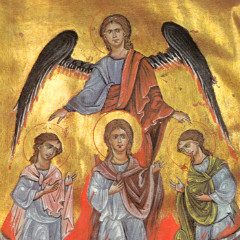
Everybody knows the story of Shadrach, Meshach and Abednego, right? If you’ve stepped anywhere near Sunday school, heard an old-timey gospel song, or glanced sideways while your four-year-old watched VeggieTales, you’ve picked it up.
It’s an compelling story of faith and rescue, and today the Orthodox and Lutheran churches celebrate Hananiah, Mishael, and Azariah — their Hebrew names — along with Daniel the Prophet. But what many may have missed are two songs, “The Prayer of Azariah” and “The Song of the Three Youths.”
Most modern English Bibles are missing them, though if you pick up a copy of the Septuagint or a Catholic Bible you’ll find them nestled there in chapter 3 of Daniel. If you use the Anglican Book of Common Prayer, you might also be familiar with the second song under the title “Benedicite, omni a opera.” It’s also found in the Catholic Breviary and various Lutheran service books.
The golden image
For the story itself, the Babylonian king Nebuchadnezzar had trained Hananiah, Mishael, and Azariah (along with Daniel) for royal service. Though they were Hebrew exiles, they excelled past all the native Babylonians in their class and eventually the king appointed them as provincial governors.
But then the king threw them a curveball. He erected a golden idol and demanded they — along with everyone else in the kingdom — bow down and worship. Any who refused would be thrown into a fiery furnace.
Faithful to the God of their fathers, Hananiah, Mishael, and Azariah obviously could not do this. When Nebuchadnezzar “in furious rage” demanded their presence threatens them with he furnace and asks, “[W]ho is the god that will deliver you out of my hands?” (Daniel 3.15)
They answered the king together. “O Nebuchadnezzar,” they said, “we have no need to answer you in this matter. If it be so, our God whom we serve is able to deliver us from the burning fiery furnace; and he will deliver us out of your hand, O king. But if not, be it known to you, O king, that we will not serve your gods or worship the golden image which you have set up” (vv. 16-18).
Nebuchadnezzar was furious and “ordered the furnace heated seven times more than it was wont to be heated” (v. 19). The furnace was so hot that it killed the men charged with tossing the three youths inside, but in they went. Here’s where some Bibles lose the story; stay with it, however, and you will be rewarded.
Pure worship
Hananiah, Mishael, and Azariah walked amid the flames, the last simultaneously offering a stirring prayer of confession and repentance:
Blessed art thou, O Lord, God of our fathers,
and worthy of praise;
and thy name is glorified for ever.
For thou art just in all that thou hast done to us,
and all thy works are true and thy ways right,
and all thy judgments are truth.
Thou hast executed true judgments in all that
thou hast brought upon us
and upon Jerusalem, the holy city of our fathers,
for in truth and justice thou hast brought
all this upon us because of our sins.
For we have sinfully and lawlessly departed from thee,
and have sinned in all things and have not
obeyed thy commandments;
we have not observed them or done them,
as thou hast commanded us that it might go well with us.
So all that thou hast brought upon us,
and all that thou hast done to us,
thou hast done in true judgment.
Thou hast given us into the hands of lawless
enemies, most hateful rebels,
and to an unjust king, the most wicked in all the world.
And now we cannot open our mouths;
shame and disgrace have befallen thy servants and worshipers.
For thy name’s sake do not give us up utterly,
and do not break thy covenant,
and do not withdraw thy mercy from us,
for the sake of Abraham thy beloved
and for the sake of Isaac thy servant
and Israel thy holy one,
to whom thou didst promise
to make their descendants as many as the stars of heaven
and as the sand on the shore of the sea.
For we, O Lord, have become fewer than any nation,
and are brought low this day in all the world
because of our sins.
And at this time there is no prince, or prophet, or leader,
no burnt offering, or sacrifice, or oblation, or incense,
no place to make an offering before thee or to find mercy.
Yet with a contrite heart and a humble spirit
may we be accepted,
as though it were with burnt offerings of rams and bulls,
and with tens of thousands of fat lambs;
such may our sacrifice be in thy sight this day,
and may we wholly follow thee,
for there will be no shame for those who trust in thee.
And now with all our heart we follow thee,
we fear thee and seek thy face.
Do not put us to shame,
but deal with us in thy forbearance
and in thy abundant mercy.
Deliver us in accordance with thy marvelous works,
and give glory to thy name, O Lord!
Let all who do harm to thy servants be put to shame;
let them be disgraced and deprived of all power and dominion,
and let their strength be broken.
Let them know that thou art the Lord, the only God,
glorious over the whole world.(Prayer of Azariah 1.3-22; Daniel 3.26-45 LXX)
In his book The Rest of the Bible Theron Mathis notes that Azariah cannot personally be blamed for the sins of Israel, but he nonetheless takes personal responsibility for them before God. Because of his own contrition and solidarity, “he can make this confession on behalf of the people.”
Despite being surrounded by flames, Azariah begs Got to deal and forebear with Israel. He reminds God of his covenant with Abraham and then strikingly, amazingly, identifies his companions and himself as a sacrifice for the people. “[W]ith a contrite heart and a humble spirit may we be accepted. . . .”
Comments Mathis, “The worship of Israel had become corrupted, and exile from the temple made it incomplete.” There had been no sacrifice since leaving Jerusalem. “Yet Azariah offers himself totally to God as an act of pure worship.” This is messianic, christological. Azariah is putting himself in the place of all Israel and offering himself as a total, complete sacrifice, prefiguring Jesus Christ.
The angel in the fire
The servants of the king kept feeding the furnace, cranking up the heat. Flames blasted through the walls and consumed those nearby. And just then, says the text, “the angel of the Lord came down into the furnace to be with Azariah and his companions, and drove the fiery flame out of the furnace, and made the midst of the furnace like a moist whistling wind, so that the fire did not touch them at all or hurt or trouble them” (Prayer of Azariah 1.26-27; Daniel 3.49-50 LXX).
What could they do but break into worship?
Blessed art thou, O Lord, God of our fathers,
and to be praised and highly exalted for ever;
And blessed is thy glorious, holy name
and to be highly praised and highly exalted for ever;
Blessed art thou in the temple of thy holy glory
and to be extolled and highly glorified for ever.
Blessed art thou, who sittest upon cherubim
and lookest upon the deeps,
and to be praised and highly exalted for ever.
Blessed art thou upon the throne of thy kingdom
and to be extolled and highly exalted for ever.
Blessed art thou in the firmament of heaven
and to be sung and glorified for ever.Bless the Lord, all works of the Lord,
sing praise to him and highly exalt him for ever.
Bless the Lord, you heavens,
sing praise to him and highly exalt him for ever.
Bless the Lord, you angels of the Lord,
sing praise to him and highly exalt him for ever.
Bless the Lord, all waters above the heaven,
sing praise to him and highly exalt him for ever.
Bless the Lord, all powers,
sing praise to him and highly exalt him for ever.
Bless the Lord, sun and moon,
sing praise to him and highly exalt him for ever.
Bless the Lord, stars of heaven,
sing praise to him and highly exalt him for ever.
Bless the Lord, all rain and dew,
sing praise to him and highly exalt him for ever.
Bless the Lord, all winds,
sing praise to him and highly exalt him for ever.
Bless the Lord, fire and heat,
sing praise to him and highly exalt him for ever.
Bless the Lord, winter cold and summer heat,
sing praise to him and highly exalt him for ever.
Bless the Lord, dews and snows,
sing praise to him and highly exalt him for ever.
Bless the Lord, nights and days,
sing praise to him and highly exalt him for ever.
Bless the Lord, light and darkness,
sing praise to him and highly exalt him for ever.
Bless the Lord, ice and cold,
sing praise to him and highly exalt him for ever.
Bless the Lord, frosts and snows,
sing praise to him and highly exalt him for ever.
Bless the Lord, lightnings and clouds,
sing praise to him and highly exalt him for ever.
Let the earth bless the Lord;
let it sing praise to him and highly exalt him for ever.
Bless the Lord, mountains and hills,
sing praise to him and highly exalt him for ever.
Bless the Lord, all things that grow on the earth,
sing praise to him and highly exalt him for ever.
Bless the Lord, you springs,
sing praise to him and highly exalt him for ever.
Bless the Lord, seas and rivers,
sing praise to him and highly exalt him for ever.
Bless the Lord, you whales and all creatures
that move in the waters,
sing praise to him and highly exalt him for ever.
Bless the Lord, all birds of the air,
sing praise to him and highly exalt him for ever.
Bless the Lord, all beasts and cattle,
sing praise to him and highly exalt him for ever.
Bless the Lord, you sons of men,
sing praise to him and highly exalt him for ever.
Bless the Lord, O Israel,
sing praise to him and highly exalt him for ever.
Bless the Lord, you priests of the Lord,
sing praise to him and highly exalt him for ever.
Bless the Lord, you servants of the Lord,
sing praise to him and highly exalt him for ever.
Bless the Lord, spirits and souls of the righteous,
sing praise to him and highly exalt him for ever.
Bless the Lord, you who are holy and humble in heart,
sing praise to him and highly exalt him for ever.
Bless the Lord, Hananiah, Azariah, and Mishael,
sing praise to him and highly exalt him for ever;
for he has rescued us from Hades and saved
us from the hand of death,
and delivered us from the midst of the burning fiery furnace;
from the midst of the fire he has delivered us.
Give thanks to the Lord, for he is good,
for his mercy endures for ever.
Bless him, all who worship the Lord, the God of gods,
sing praise to him and give thanks to him,
for his mercy endures for ever.(Prayer of Azariah 1.29-68; Daniel 3.52-90 LXX. Incidentally, this iteration is from the RSV and is translated from Theodotian’s version. You can read the Old Greek version here side by side with Theodotian’s; it differs slightly.)
About this point, Nebuchadnezzar looked into the furnace and saw not three people inside, but four. “I see four men loose, walking in the midst of the fire, and they are not hurt; and the appearance of the fourth is like a son of the gods” (Daniel 3.25; v .92 LXX).
Indeed, the son of God. While the fourth was an angel, the church recognizes that it was the second person of the Trinity manifesting in the form of an angel — what’s called a theophany. Some icons of the scene even show a cross in the angel’s halo.
Witness and example
Writes Mathis, “The deliverance of the three youths foreshadows the crucial events of our salvation — the Cross, the grave, and the third-day Resurrection. The innocent men were united with the Cross through their own martyrdom, and the furnace imaged the grave and Hades,” something they indicate in the song itself. It is this connection to being delivered from Hades that the church remembers on Great and Holy Saturday, when Christ deliberately descends into death and liberates the captives.
“The Prayer of Azariah” and “The Song of the Three Youths” point us to the perfect expression of Christian devotion: a willingness to witness before God to the point of death; a willingness to praise him amid disaster; a willingness to stand in solidarity with all his people, even to the point of taking responsibility for their sins; a willingness to stand in their stead, looking only to God for salvation; and ultimately a willingness — a driving desire — to call all of creation to do the same.
That’s what it means to be a Christian, and that’s what the example of Hananiah, Mishael, and Azariah call us to be.
















